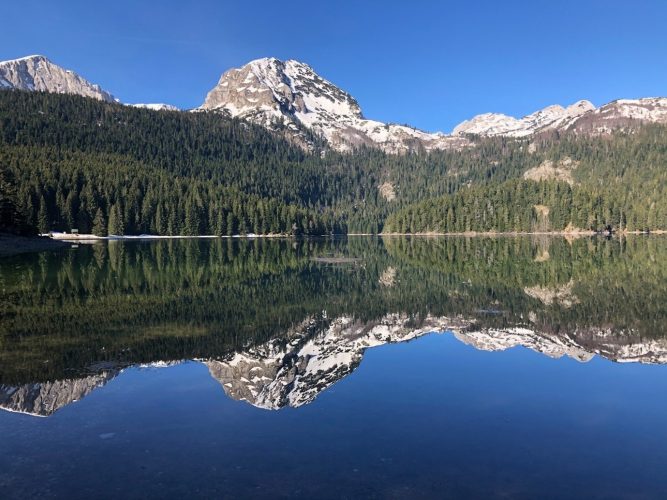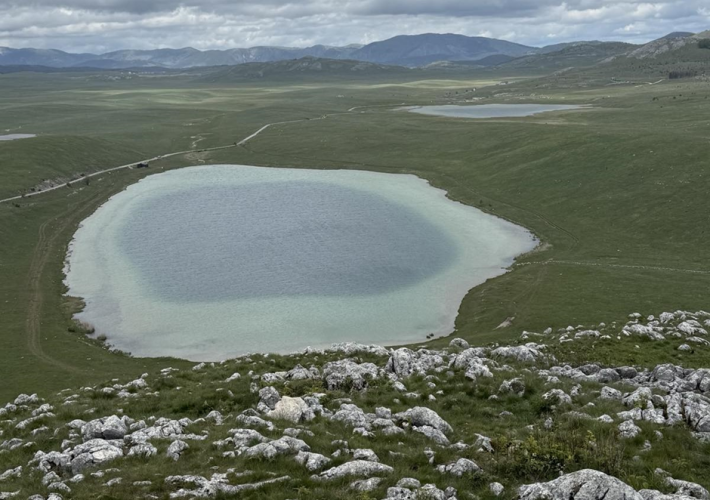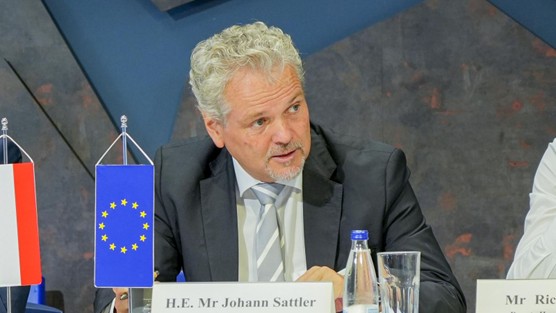Montenegro has made a certain progress in the field of environment protection and adaptation to climate change, particularly when it comes to adoption of the relevant legislative basis and implementation of certain key projects. However, since the Government has set an ambitious goal – to close all the chapters by the end of 2026, it is clear that the activities in this area must be significantly intensified, says the Ambassador of the European Union in Montenegro, Johann Sattler.
He says that, when we talk about chapter 27, we actually talk about the air we breathe, water we drink and nature we are to leave to our children. “The decisions we make in the field of the environment have a direct impact on the health, quality of life and future of our citizens. Clean air, drinking water and preserved nature are not matters of luxury, but the basic needs and rights of every citizen. That is why this chapter is of such a high importance for Montenegro’s European path”, underlines Sattler for the latest issue of Eurokaz.
He thinks that the challenges are numerous – starting with the implementation of the adopted laws, all the way to the adoption of sectorial strategies we are waiting for years, as well as the necessary secondary legislation, particularly in the field of waste management, air quality, nature protection and climate change. “It is of key importance to establish a sustainable system of financing, additionally strengthen the institutional and administrative capacities, so that Montenegro can meet the obligations within Chapter 27 within the given deadlines. At the same time, it is necessary to prepare administration and institutions for accession to European structural funds that will be available after the formal accession to the European Union”, said Sattler.
Director of the Agency for Environment Protection, Milan Gazdić, said that Chapter 27 was one of the most complex and most demanding chapters in the process of accession to the EU, but that it was realistic to expect that, with intensive efforts, progress could be made on closing it by the end of 2026 and that it depended on the continuous political support, availability of the financial and human resources and establishment of the functional systems for managing the environment.

At the same time, the director of the NGO Green Home Azra Vuković is of the opinion that Montenegro has serious difficulties in regulating the fields related to the environment protection in legislation, and even more serious difficulties in implementing the legislation.
“Given all of this and being aware of the financial and administrative capacities of the responsible institutions and the political atmosphere where very often party interests are given priority over the public interest, it is very difficult to expect the obligations within Chapter 27 to be met in such a short time,” said Vuković.
Sattler warns that meeting of the benchmarks within Chapter 27 is uneven. There are areas where Montenegro has achieved some concrete progress, like civil protection where it is among the leaders in the region. “I will remind you that Montenegro has been a member of the EU Civil Protection Mechanism since 2015, which enables it to seek and provide assistance in crisis situations like fires, floods or earthquakes. It has already received support within this mechanism in form of equipment and experts, and it also showed solidarity by providing assistance to other members. However, the significant challenges are still there, particularly in the field of waste management, air quality, nature protection and climate change”, says Sattler.
Ambassador Sattler also noted that a significant breakthrough was made in the field of waste because the new Waste Management Law was adopted and it had been on hold for a long time. “Development of secondary legislation is in progress and the adoption of the National Waste Management Plan, the key strategic document, is expected. The problems of illegal waste disposal and numerous wild landfills demand a multi-sectorial approach: from education and awareness of citizens, to strong inspection and efficient sanctioning policy. We need to emphasize also that successful implementation of infrastructural projects for the treatment of waste waters, collectors and sewage networks are very important for achieving progress in the Chapter 27. Efficient wastewater treatment systems reduce pollution of rivers, seas and ground waters, which protects eco-systems and public health. In addition to this, modernization of collectors and sewage networks contributes to sustainable development of urban areas, increases capacities and reduces the risk of floods and pollution”, said Mr Sattler.
He added that sometimes he had an impression that citizens were underinformed about the long-term benefits of these projects. “When it comes to nature protection, the challenge is not only to declare an area protected, but also to develop management plans and prove that the system has the capacity to implement the declared protection in practice – particularly in the context of the Natura 2000 network”, underlined Ambassador Sattler.
As he says, in the field of climate change, the additional challenge is the dynamic nature of EU legislation, that keeps evolving and improving. Specialized human resources are therefore needed to transpose that legislation in a proper way into the Montenegrin legal framework. “As for the possibility of closing the chapters without fully meeting all the benchmarks – as I already said – this chapter should not be looked at from a purely administrative point of view. Alignment with the EU standards in the field of environment protection is a direct investment into the health, quality of life and future of citizens. Although there are mechanisms to extend the deadlines for meeting particularly complex obligations after the accession (this refers to the so called “transitional periods”), it is in Montenegro’s best interest to ensure for its citizens as soon as possible the same level of safe and healthy environment that is enjoyed by the citizens across European Union. That is why my message is – although for some more demanding obligations there will inevitably be some transitional periods, we should put efforts into ensuring that Montenegro implements the highest European standards as soon as possible and as successfully as possible in the interest of all citizens that deserve healthy and safe environment”, said Sattler.
For the latest issue of Eurokaz, Gazdić said that, although there was a clear willingness to speed up the process of meeting the obligations, closing of chapter 27 requires not only adoption of legislation, but also its full implementation in practice, as well as strong institutional strengthening.

For the latest issue of Eurokaz, Vuković said that, in the context of Chapter 27, promises that all the obligations would be met in a very short period of time, i.e. by the end of 2026, were given too easily.
“We often lack at least one element to complete the process. I want to remind that granting Ulcinj Saline the appropriate protection status and effective implementation of necessary preservation measures that lead to the improvement of the preservation status constitute one of the closing benchmarks in this chapter. However, Solana was declared a protected area 6 years ago, but the agreement about the manager has not yet been reached and thus the process is still ongoing”, said Vuković.

She added that, when it comes to waste management, adoption of the new law was one of the first obligations within this chapter. “The process of adoption of this Law took as long as 7 years, while the adoption of secondary legislation is still under way. Let alone the establishment of the waste management system that can respond to EU requirements in terms of reducing the amount of waste that ends up in the landfills”, she underlined.
Vuković noted that Montenegro did not have the key strategic policies, laws and secondary legislation in numerous areas related to the environment protection – waste management, air quality, biodiversity, etc. “We do not have the amended laws. They have been in the process for a very long time. I am referring to the Law on Nature Protection. Law on National Parks, etc. In the recently published “Shadow Report for Chapter 27 – in the trap of time” that was published by Coalition 27 (informal network of 18 NGOs from Montenegro) it was noted that we thought that in the previous year Montenegro had achieved a limited progress in this chapter. The reason for that lies in the fact that implementation of the closing benchmarks in Chapter 27 is very slow and it takes a lot of time to implement activities. We have a very large part of the obligations that are partly met, and deadlines for implementation are often extended,” said Vuković.

Ambassador Sattler thinks that the state has undertaken certain important steps in meeting the obligations within Chapter 27, but that it is clear that there is still a lot of work to be done – particularly when it comes to consistent implementation of the law, strengthening of institutions and more efficient application of policies in the field. “Reforms in the field of environment protection cannot remain on the paper only – they must be visible in everyday life of citizens: in cleaner air, unpolluted rivers, healthier nature. It is of key importance that the state, in cooperation with the EU, international partners, civil society and private sector, ensures not only full alignment of legislation with European legislation, but also their genuine, effective application. Education has a particularly important role in that process – investment into knowledge is investment into changing the mindset, into new generation that will respect and not pollute nature”, said Sattler.
He noted that he did not accept the thesis that wild landfills, polluted rivers or poor air quality were our “mentality” and that it could not be changed. “No – we have seen in many other countries that the change is possible. My country, Austria, used to have the same problems – waste along the roads, old refrigerators in the woods – and today it is unthinkable to see anything of the kind. The change happened, not because the Austrians have different mentality, but because of the smart connections between education, efficient laws, good sanctioning policy and their consistent application”, he added.
Sattler reminded that it was precisely why the Delegation of the European Union in Montenegro, in close cooperation with the national and local institutions, civil society and the media, on 5 June – the World Day of the Environment – launched a National Campaign “Save to Feel Safe”. The goal of the campaign is clear: raise awareness, encourage change in behaviour and strengthen environment protection in Montenegro. Although the key partner in this campaign is the Ministry of the Environment, the campaign does not belong to one institution only – it is a joint venture of the “coalition of the willing”: state institutions and schools, NGO activists, athletes, the young, artists and enterprises. The message of the campaign is that everyone can contribute – by reporting environmental incidents, not using plastic bags, educating the young or removing wild landfills. And that, with serious approach, responsibility and persistence, even the firmest habits can change. In the end, the truth is simple: Montenegro cannot be called an ecological state only because that is written in its Constitution. It must prove it every day, with every action and every decision. And that is the task of the entire society in Montenegro that European Union rightfully encourages and actively supports”, said Sattler.
Gazdić underlined that Montenegro made visible steps forward, particularly in the process of adoption of the legislative framework. “Important strategies and laws were adopted, and a part of them is already aligned with European standards. Still, it is important to make a difference between adoption of legislation and their genuine application in practice. The key issue that remains is how to ensure that what is regulated in legislation is implemented in daily functioning of the institutions and society. There is a visible progress, but given the complexity of the field, stronger coordination is needed, as well as commitment of all relevant stakeholders so that the results can be manifested in the field in a faster and more sustainable manner.
Vuković said that, generally, in the accession negotiations, the rule was that the chapters could be closed only after all interim and closing benchmarks were met. “The practice has shown that the EU can show a certain level of flexibility, but under clearly defined conditions. EU can approve closing of chapters if benchmarks are formally met, but in that case some solutions are expected in the period after the closing, with precise plans, time frameworks and financial guarantees. For example, certain infrastructural investment may be postponed for the period after the accession if legal, planning and institutional aspects are met, and the implementation (e.g. construction of a plant) is postponed for the period after the accession”, said Vuković.

Ambassador Sattler said that closing of the Chapter 27 by the end of 2026 could be one of the most inspiring stories of Montenegro on the European path showing that, with a clear focus and joint efforts, success could be achieved. “That would be a confirmation that Montenegro can meet even the most difficult challenges, because this chapter requires deep systemic changes and tangible results in the field, and not only adoption of legislation. Still, with a clear plan, acceleration of activities and continuous strengthening of administrative capacities, this goal is not out of reach. It will be of key importance that the institutions show determination, that there is a continuity of political support on all levels and that all stakeholders – national authorities, local self-government, civil society and economy – work in synergy. If these conditions are met, Montenegro can use this opportunity not only to close one chapter in the negotiations, but to achieve the key turning point for the healthy environment and higher quality of life for its citizens,” said Sattler.
Gazdić says that certain benchmarks have already been met, while some are in the process, which is expected given the scope and complexity of this chapter. “The pace of meeting the benchmarks varies depending on how demanding certain areas are in institutional, technical or financial terms.
A particular challenge is sustainability – not only in terms of implementing legislation, but also in terms of the functioning of the systems that have to last and be resilient to changes. Achieving that requires higher predictability in planning, better cooperation between the sectors and more active role of all levels of authorities. It is important to approach this in a systemic and not in a partial manner – because the effects can be achieved only if all the elements function together”, said Gazdić.

Vuković thinks that the manner in which “development” projects in Montenegro are planned, and nature treated in such projects is far from European standards. “Neglecting natural values of sites that have multiple protection status both on the national and on the international level in the process of planning space and in the process of planning projects is not in line with European standards. Implementation of the agreements will not be possible in the way in which it was designed in the first place and presented to Montenegrin public if the chapters are to be closed. In the context of public procurement, for example, for which the chapter has been closed, Montenegro got an imperative to ensure that implementation of the Agreement in not in conflict with the EU acquis on public procurement, that it is in line with the principles established in the Stabilisation and Association Agreement, including transparency, equal treatment and non-discrimination, which will be closely monitored by the EU. I expect a similar approach in the context of Chapter 27”, warned Vuković.
At the same time Gazdić thinks that every development project must be in line with the current legislation in the field of the environment. “That is the basic rule, regardless of who the investor might be and how high the investment is. It is precisely why there are procedures like the environment impact assessment. They are here to ensure that every project is analysed in detail before approval is issued. As for the protected areas and those who still do not have formally established management structure, this additionally emphasises the need for careful planning and establishing managers according to the law. Investment may have a positive effect if implemented in a planned manner and in line with the laws, but they must respect the principles of sustainable development”, said Gazdić.
Sattler said that, on one side, investment can contribute to mobilisation of resources and encourage sustainable development, including financing and transfer of knowledge and technologies. “On the other side, they can constitute a challenge if their implementation is not fully aligned with the European standards in nature protection and sustainability principles. Given Montenegro’s aspirations to become an EU Member State, its economic growth must be achieved in the way that is in line with the EU standards, while agreements must be implemented in a transparent way and in line with the EU acquis in different areas. European Commission will closely monitor this, and it is willing, if needed, to provide Montenegro with support in that process”, said Sattler.
By Milan Žugić, MINA
This text was published in the 16th issue of Eurokaz magazine.


